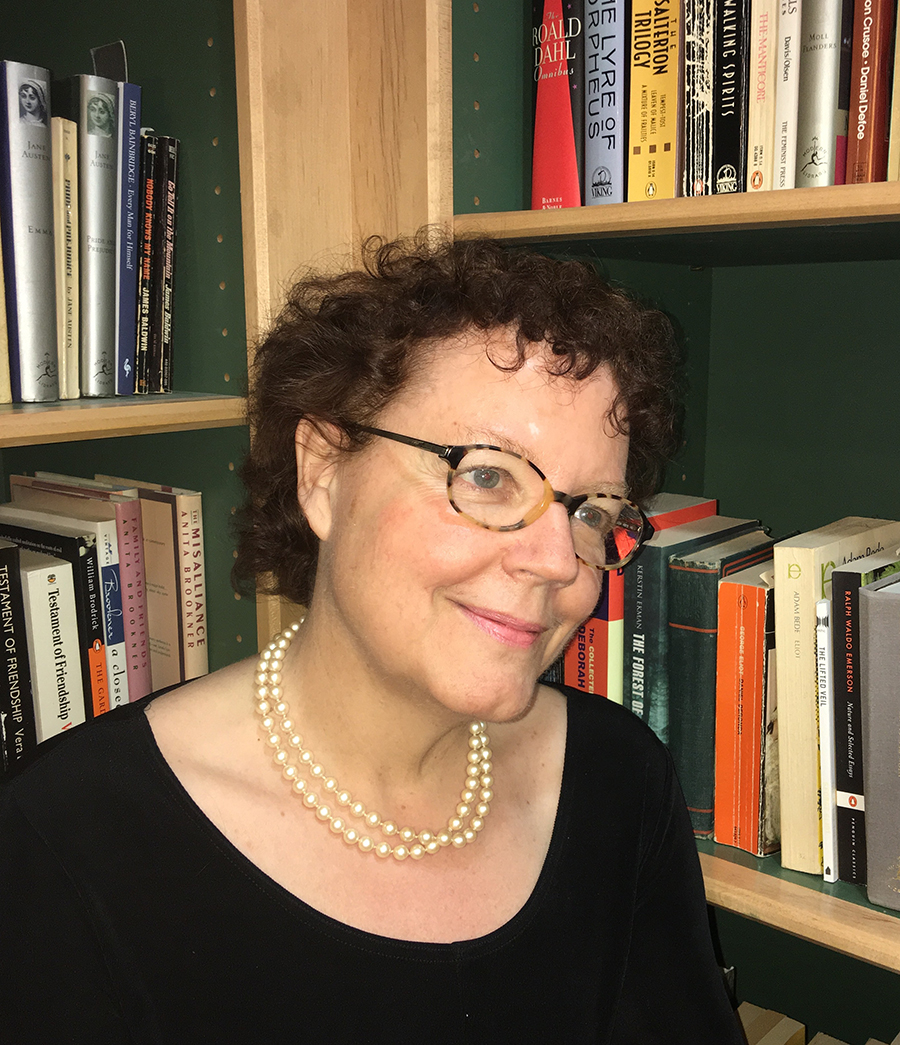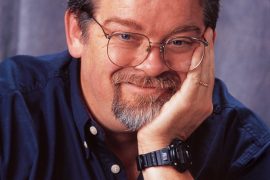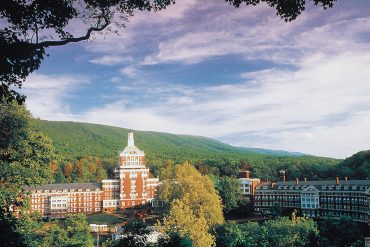A chat with Pulitzer Prize-winning author Julie Keller about growing up in Huntington, studying at Marshall, her favorite writers and what’s next in her literary career
While Pulitzer Prize-winning author Julia Keller currently divides her time between rural Ohio and Chicago, her hometown of Huntington looms large in her life. For Keller, the sounds and scenes of Huntington, West Virginia, and Marshall University form the backdrop that floods her memory and informs her novels.
Her critically acclaimed mystery series is set in the fictional town of Ackers Gap, West Virginia. Beginning with A Killing in the Hills, her four novels and three novellas feature the tough female prosecutor Bell (aka Belfa) Elkins. The latest in the series, Last Ragged Breath, takes on the struggle between private landowners and a corporation that wants to buy them out. Other books in the series include Bitter River and Summer of the Dead. The fifth, Sorrow Road, will be released in August 2016.
An English major at Marshall University in the 1980s, she always assumed she’d get a liberal arts degree, work for a newspaper for a few years and then begin writing fiction, as she had wanted to do since early childhood. So, after receiving her master’s degree from Marshall, she wrote for The Daily Independent in Ashland, Kentucky.
Following her doctoral degree from Ohio State University, she was awarded a Nieman Fellow at Harvard University. Later she served as the McGraw Professor of Writing at Princeton University. She also taught at the University of Notre Dame and the University of Chicago.
During her 12 years with the Chicago Tribune she wrote a three-part feature on the deadly tornado that swept through Utica, Illinois, that won her the Pulitzer Prize – the only one the newspaper holds for feature writing. She has since served as a Pulitzer Prize juror four times, was the longtime book critic for the Chicago Tribune and reviews books for National Public Radio.
We asked HQ contributor Carter Seaton Taylor (an award-winning author herself) to chat with Huntington’s most acclaimed writer about growing up in Huntington, her years at Marshall, winning the Pulitzer and how she fulfilled her lifelong dream of becoming a novelist.
Tell us about growing up in Huntington, specifically as a member of the Marshall University family.
Marshall was really at the center of my life growing up. My father was a mathematics professor, and some of my earliest memories are going to the basement of Old Main – that’s where they had the faculty mailboxes. My sisters and I would go along with my dad and pick up his paycheck, and then we would go to the drive-thru at the Twentieth Street Bank and he would deposit his paycheck. I went to public schools except for my seventh-grade year when I attended the Jenkins Laboratory School [also known as Marshall College High School]. Right after my seventh-grade year they closed the lab school, to my great regret. That was an extraordinary and pivotal year. What a wonderful experience. I’m still in touch with some of my classmates from that year. My mother went through all of her schooling at the lab school. I don’t know why we didn’t go in elementary school. It might have been a matter of cost. We moved a great deal during my childhood. My grandfather, Edward T. Edmonds, owned a business that still operates to this day – Economy Frosted Foods at 333 Seventh Ave. He also owned a lot of houses, so we would live in a lot of his properties. I went to school in the West End at Jefferson Elementary, and then I went to Geneva Kent for fourth, fifth and sixth grades. Eighth and ninth grades were at Beverly Hills Junior High School, and then I graduated from Huntington East High School in 1974.
Who are some of your former teachers that you recall?
There was a science teacher at the Jenkins Laboratory School named James Thompson who was just wonderful. He was one of those teachers who could make the most arcane and difficult material come alive so learning was a matter of excitement, not drudgery. Another was Ruth Thornton who taught Latin at East High School.
What are some of your favorite memories of Huntington?
You know, I wrote an article when I was first on staff at The Columbus Dispatch about my memories of home. I think in everybody there sleeps these really vivid memories that are more powerful and indelible than any other memories you have, and they are the ones from your childhood. For me it’s Stewarts Hotdogs. It’s the riverbank. I recall the look of the river, particularly as evening would come and coal barges coasted along with searchlights that would sweep back and forth across the water. That’s one of my most intense memories – just a deep pleasure of being in the presence of the river. And Marshall, as you mentioned. Because my dad was a math professor he enjoyed keeping statistics on both the football and the basketball teams. I would go with him to all the games at the old Memorial Field House. I would sit at the scorer’s table with the press and just felt like I was queen of the world. It was great fun.
Was it always decided you would go to Marshall?
Yes, it really was. I talked about wanting to go other places, but my dad’s thought was Marshall was a fine school, it’s right here and, he believed, your undergraduate years were better spent at a smaller school – then your graduate work can be somewhere else when you settle on a field. My graduate work on my Ph.D. is from Ohio State University, so I fulfilled the path he envisioned.
What was your major at Marshall? Who were some of your favorite professors?
English. I’ve always been an English literature major. I’ve never actually taken any journalism courses. There were so many great professors during my time at Marshall. Eric Thorn was one of them. His world literature class is one of those life-changing classes. It’s one of those where you walk out a different person than when you started – your head is swimming with ideas, your soul on fire from these magnificent readings you would never otherwise come into contact with. Another was Marilyn Putz, who I know recently passed away. I was sad to read about that. I had her for creative writing and for short stories. She was a wonderful professor. I remember Joan Adkins and the late Warren Wooden who taught renaissance poetry. I took a renaissance poetry class from him one summer, and again, it was just one of those classes you never forget. It stays with you.
Did you ever write for The Parthenon?
I did not. I never went anywhere near a journalism class. I had sort of an old-fashioned notion that if you wanted to be a writer then you were an English major and you read great works of literature. Then, you get a job at a newspaper as was the time-honored tradition of so many authors like Thornton Wilder, Katherine Anne Porter and Ernest Hemingway. They all were English majors and then worked for a newspaper and got a taste of the world. That’s what being a general assignment reporter for a newspaper did for you. I didn’t think of journalism itself as my career – it was the idea that journalism would precede a writing career.
How does writing fiction fulfill you in a way journalism didn’t?
That’s a great question, because that’s exactly what happened. I’d always intended to be a novelist and a writer of stories I would actually concoct. In fact, there’s a line from the poet Robert Lowell that I’ve always loved. He said, “I want to make something imagined, not recalled.” I really love that because it speaks to that great desire within yourself to write your own stories. Today my background and my years as a journalist inform my writing. But they’re my stories. They run through the prism of my imagination and come out the other side. For me, I waited a long time to do that. I got caught up in journalism, as one does, and it’s a wonderful career and laboratory for writing. I worked for The (Ashland) Daily Independent, The Columbus Dispatch and the Chicago Tribune. These are really fine newspapers. I worked with great colleagues under fine editors, so I have no complaints about those years. But for me, just as you suggest by your question, I came to a point where I realized I had veered off the path I always intended for myself. And this was to write my own stories and to give my own particular version and vision of the world. That’s what I was able to do in 2012 when I left the Tribune and my novel was published. I had published two books before that, but A Killing in the Hills is really what I consider to be the beginning of my fiction-writing career.
When did you first know you wanted to become a writer?
I remember my dad would bring home the used paper from the old dot matrix printers and I would write my stories on those starting in the second and third grades. I was writing novels. I had a mystery series with a protagonist whose name was Christopher Lee Carson. I wrote science fiction stories, one I recall was called “Trapped in a Glacier.” It was about a rocket ship that somehow fell back to Earth – there was a family aboard it and it fell inside a glacier. The scientific accuracy of that is a bit dubious, but it made for a very exciting adventure story.
Who were some authors that have inspired your style of writing?
The life-changing event for me was reading Madeleine L’Engle’s book A Wrinkle in Time. That book was the first time I remember being so swept away by a story that I was too excited to sleep, too excited to eat, too excited to even go about my daily life until I could get back to that book. To hold this thing in my hand, this book, and to realize the great power she had by putting words on a page and creating these characters, was one of the most exciting moments I can remember. I thought, “That’s what I want to do.” The works of Ray Bradbury were also terribly important to me. Also, another science fiction writer named Robert Silverberg wrote a book called Revolt on Alpha C, and that was another one of those books – I kind of get goose bumps when I remember what it was like to read that book and be so caught up in it.
I don’t remember not knowing how to read, do you?
That’s an interesting way to put it, but I would agree with that. Growing up, we had a lot of books in the house, and there was one I remember puzzling over and trying to figure out what the words were. It was Pride and Prejudice. Your words are so much a part of your world that they are really always under your skin. You’re never outside of the world of words. I, too, can’t really remember a time when words weren’t just absolutely flying around me creating this magical net of wonders.
Who are your favorite authors today?
I think one of the great American authors of all time is Willa Cather. And even though she is very celebrated, I think she’s still terribly underrated. Even her lesser novels are just splendid works of art. Her book The Song of the Lark is one of my very favorite books. My doctoral dissertation was about the novels of Virginia Woolf, so I would have to include her as well as one of my favorites. I often tell friends who were puzzled by her work that I was, too. The daughter of a friend of mine had to read a Virginia Woolf novel in high school. She called me and asked, “Can you talk to my daughter? She can’t make heads or tails of it.” And I told her the truth, which was, “Neither could I in high school.” I think with her work you have to grow your way into it and allow yourself to be a bit puzzled, maybe even a bit bored, and then the magic, beauty and cadence of the language will get you.
In 2005 you won a Pulitzer Prize in feature writing. Tell us about that.
That was a very long, three-part story about a tornado that swept through a small Illinois town. The original assignment was to go and do one story on how people were recovering. But once I was there and began talking to people I realized the material was really richer than that. Instead, with my editor’s great enthusiasm, I chose to spend many months there among the people. The core of the story is how we come to terms with the randomness of fate. As human beings, we like to order the universe and make the universe comprehensible. We like logic, we like cause and effect. What happens when we don’t have that? The tornado was this random event that just happened. I’m sure you’ve seen aerial photos of the aftermath of a tornado – it will go through and leave one line of homes intact and then just tear through another. That’s what happened in this small town. People were doing exactly what they should do – they went to a structure in town and went to the lowest spot in the basement, and the building collapsed on top of them. It was completely random whether you lived or you died, so what I tried to explore in the story was how as human beings we come to terms with that. Do we use our religion, our faith, our science? What do we do with that? It became a meditation on how human beings deal with randomness and catastrophe.
It sounds like it certainly deserved a Pulitzer.
The thing about prizes though is this – there are so many wonderful things in this world that don’t get the recognition they deserve. It was very nice. I was absolutely thrilled to win a Pulitzer Prize. It certainly enhanced my career. After that, your work is taken seriously and that’s all to the good. But when I teach, I tell my students that you really have to know in your own heart and mind the value of your work and not let the world tell you what its value is. You can’t let that be the guide to the meaning of your work. It’s taken me many years to get there myself. There has to be a point where you know the value of it, particularly with something like a Pulitzer Prize where your competition is some of the very best writing in the country.
My curiosity is getting the better of me. How, based on all the other novels that you’ve written, did you get interested in the inventor of the Gatling gun for your book Mr. Gatling’s Terrible Marvel?
I was doing a story one day in the Tribune newsroom and I was trying to use the Gatling gun as a metaphor. I was looking up the correct way to spell it and I happened to read the online bio of Richard Jordan Gatling. When I tried to find a longer biography, because I love reading biographies, there wasn’t one. There wasn’t a biography for this man who invented a weapon that we’ve all heard of. I just became more and more fascinated with him and then was able to get a contract to write a book about his life, his work and how that changed the world. Killing before then had been a matter of one-on-one. If I wanted to kill you, I had to get very close to you. For the first time in history, killing could be impersonal and it could be in these multiples. It changed everything. To me the ultimate irony of Gatling’s story is that he invented his gun to end war. He wasn’t a warmonger. He was a Christian man. He was a man of deep moral principle, and yet he ended up ushering in the most violent century in the history of the world. He was a man of many parts and great contradiction.
You’ve taught in several different universities. Do you have a favorite?
I often say, in terms of the students, that I really enjoyed Notre Dame because of the diversity. Unfortunately these days diversity has come to mean race and ethnicity, but I mean diversity of everything. That class was equally divided between men and women. It was diverse geographically. It was diverse in terms of their majors and disciplines. They weren’t all English majors or journalism majors, and I liked that. I’d love if we could widen our understanding of the word “diversity.” At the Tribune they often had these workshops on diversity, which of course meant race and ethnicity, and I went and asked, “How many Appalachians do we have in the newsroom? How many Muslims? How many Baptists?” At that point I was invited to not return to the diversity workshop [Laughs]. It’s a beautiful word, and we’ve kind of narrowed it to mean one thing when it really means everything. I think it would be welcoming to people if it meant more than just one thing. Like Gatling, we all have many parts.
So your writing is now front and center full time, correct?
Yes, I have the fifth novel in my series, Sorrow Road, due out in August. There will be several more Belfa Elkins novels, and then I have a science fiction trilogy that we just sold called The Dark Intercept. The first volume of that will come out in the spring of 2017. My interest in science fiction has continued unabated. The publisher is Tor, which is a major science fiction publishing company. They do a wonderful job with science fiction and fantasy, so I’m very much looking forward to working with them and putting that together.
Back to Belfa Elkins. What inspired you to create her, and is she modeled after someone in your life?
Her name is after my great-aunt, Belfa Harshbarger, who was living in the Huntington area but recently passed. No one I’ve come across has heard the name Belfa before. My great-aunt said her parents came up with it. She didn’t know where they came up with it. She never heard it and never knew anyone else named that either. In terms of the character, she’s not based on anyone in particular, but I wanted to write a strong female character. I wanted a protagonist who was raised in West Virginia and left but then made the decision to come back, much to the great surprise and perplexity of her friends in the big city. I wanted that to be one of the central tensions of the book – to come back to a place where you think you can help and make a difference and to stake your claim there.
And so the books gave you a way to take on these profound social problems facing West Virginia?
Yes, that’s a great way to put it. No one ever wants to be lectured to, but I do think West Virginia and the Appalachian region are in the grip of some really devastating social problems: lack of economic progress, some of the isolation, the waning of the coal industry. And then right at the center is the prescription drug abuse.
How often do you get back to Huntington?
I don’t have a lot of family back there now, but I was back a couple of weeks ago. I still have friends there from high school. One is Roberta Ferguson, and she’s a registrar at Marshall. I’m back in touch with many of my friends from high school and grade school. I’ve gone back half a dozen times since the fall just to go and maybe have dinner and drive around. For a while I found it somewhat of a haunted place. My father died very young at the age of 51. That was a very devastating event for my sisters and me. My mother moved to Columbus after my father’s death. So coming back to Huntington, at first, was very hard for me. But as the years have gone by I can be there and enjoy it.
Do you see differences in Huntington from when you were younger?
It really has the same sort of feel to me. Some of my Marshall professor friends have complained to me about the criminal activity that has arisen in the wake of the drug abuse problems, but I don’t really see that when I’m back there. It feels very much the same type of place – this river town that has the excitement that all river towns have. I’ve always said rivers have that joyous sense of an elsewhere about them. As long as you have a river, you know about other places. Other places are creeping past you even as you’re standing there on the bank. Huntington still has that kind of magic and still casts a spell over me.





